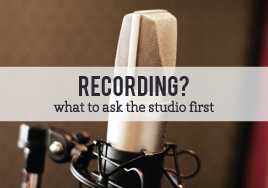
5 Questions To Ask A Studio Before Recording Music
ByEstimated reading time: 2 minutes
Recording your music is an exciting, important, and often expensive step in your music career. If you’re ready to take that step, here are some questions you should ask the studio before you start recording:
Does the recording studio specialize in genres?
There are potential benefits and disadvantages to finding a studio that specializes. A producer or audio engineer who pairs their skill with an understanding of and passion for your style can make the experience and the final product much more enjoyable. On the other hand, you want to be sure the final result still sounds like you, not the hundreds of other bands this studio has worked with. Finding the right balance is essential.
How does the studio charge?
Recording studios usually charge by the hour, but some studios might be flexible and charge for a block of time, such as a day, week, or month. Ask if there are any fees for running over, or if time costs less if you book more.
How long on average does it take to record one song?
There is no magic formula to calculate how long it will take to record your song. There are factors, though, that can help the studio give you a better idea of the time needed. A band that is prepared and well-rehearsed will likely need less takes to get a song than a band that is still deciding on an arrangement. Likewise, a complex song (say, with a gospel choir, lead singer, and ten instruments) will probably require more time and takes than a song with one singer and three instruments. Talk to the studio and see if they can give you some idea on time-frames.
What should you bring to the studio?
Bring your instruments and lyric sheets to the session. If you are not performing the instruments yourself, ask the studio if they have musicians and instruments available or if you should hire some ahead of time. If so, make sure the lyric sheets include chord progressions. The ideal producer is an all in one musical talent who can handle every phase of recording and understands various instruments. Ask if you need to bring any other equipment, especially if there is a certain item you want to use (if they don’t have it).
What happens after the recording is finished?
Usually, but not always, the session fee includes the cost of recording and then mixing and mastering the music. This is an intricate process which involves EQ adjusting and audio sweetening. Remixing is often necessary for refinement. A studio with a talented audio engineer is priceless.
If you have recorded with a studio before, what advice do you have for those heading into their first recording experience? If you are thinking about recording with a studio, what questions do you have?
See also: The Right Recording Studio For Your Music, Recording Music: Pros and Cons of Creating a Home Studio, Recording Studios: The Process.














Going back to the “bring your own instruments” statement, what if it’s a grand piano that I’m playing?
Daniel, if that’s the instrument you want, you should probably ensure that the studio has one available on site.
I like your suggestion to ask if the recording studio has specific genres that they specialize in. My sister is trying to make music and needs to choose a recording studio. I’ll pass along your tip about genres because I think it could be helpful to her.
It’s good that you point out that working in a professional recording studio can help improve the quality of your final product. I’m thinking of starting a band, and I want us to record in a professional studio so that our music will sound as good as possible. I’m going to look for a reputable recording studio in my area.